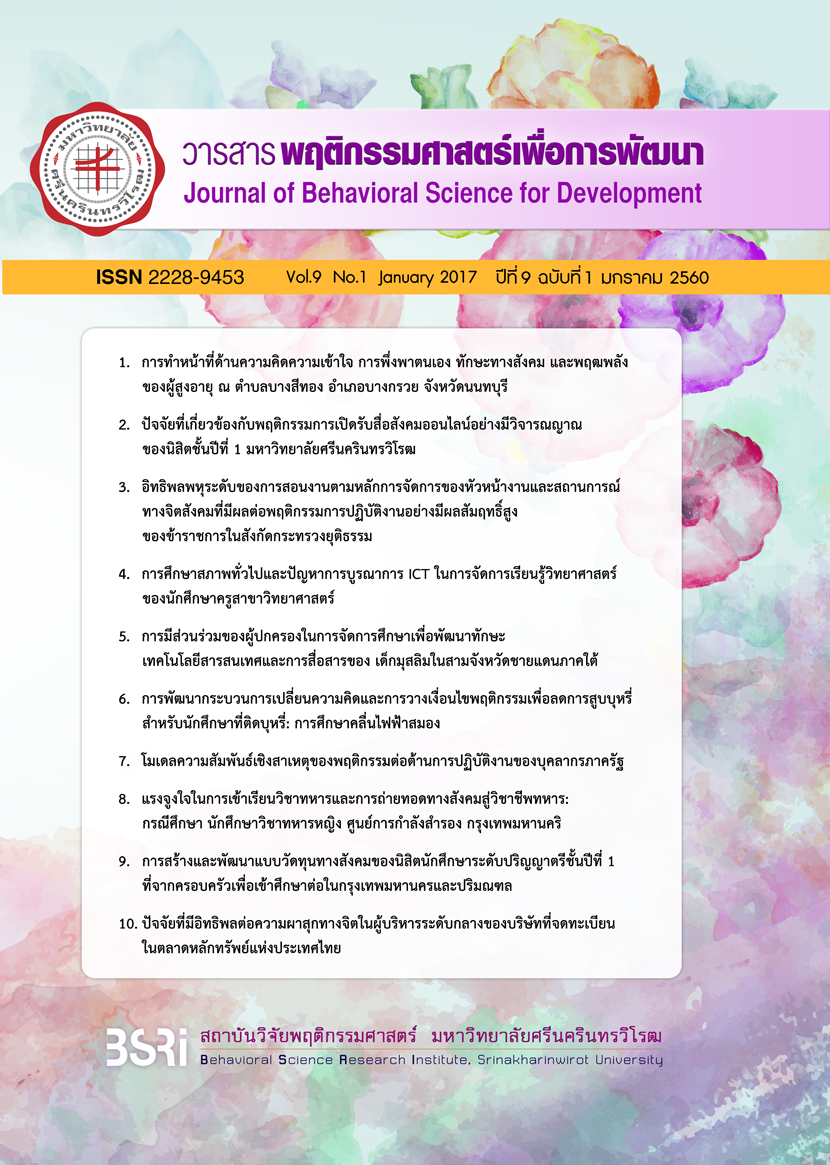การพัฒนากระบวนการเปลี่ยนความคิดและการวางเงื่อนไขพฤติกรรมเพื่อลดการสูบบุหรี่ สำหรับนักศึกษาที่ติดบุหรี่: การศึกษาคลื่นไฟฟ้าสมอง Developing the Process of Thinking Alteration and Behavioral Conditioning for Reducing Student Smoking in Nicotine-addictedStude
Keywords:
Smoking, Irrational thinking, Mindset change, Behavioral conditioning, EEG, การสูบบุหรี่, ความคิดไม่มีเหตุผล, การวางเงื่อนไขพฤติกรรม, คลื่นไฟฟ้าสมองAbstract
The present study aims to develop the process of mindset change and behavioral conditioning as a tool to aid smoking cessation for nicotine-addicted students. Qualified 38 students in vocational education with smoking behavior voluntarily participated in the study. Using simple random sampling, 19 participants were allocated into study group and the rest in the control group. The design of the study is a two-group simple randomized experiment with pretest and posttest. (Randomized Two-Group Pretest-Posttest Only Design/Pretest-Posttest Control Group Design)
The study comprises 3 stages: 1) Pre-experiment stage in which alpha brain waves of both the study group and the control group were measured using Neuroscan. During the measurement, the participants were asked to first sit in a relaxed, conscious position without paying particular attention to anything. Then, they were asked to close and open their eyes according to the designated time. Appropriate EEG frequency bands for analysis were estimated to be in the alpha range (8-13 Hz); 2) Experimental stage in which the process of mindset change and behavioral conditioning for smoking cessation was implemented with each participant in the study group. With a total of 7 activities, the process encompasses 3 steps including(1) Cognitive Training; (2) Emotion Training; and (3) Behavior Training; and 3) Post-experimental stage in which the alpha brain waves of the participants in both groups were remeasured. Differences in the average EEG alpha power of the samples were then analyzed and compared using a t-test.
The results revealeda significant decrease in EEG alpha power of those in the study group, who showed fewer smoking behaviors, at every electrode position during the post-experimental stage. On the contrary, the EEG results during the post-experimental stage of those in the control group, whose smoking behaviors remained unchanged, significantly increased at electrodes FPZ FP2 AF3 F5 F4 FC4 P5 P6 P4 PO3 PO4 PO8 O2 (p < .05). There was a significant decrease in the average EEG alpha power in the study group during the post-experiment (p < .05), compared with the control group to whom the process of mindset change and behavioral conditioning for smoking cessation was not introduced.
It can be concluded that the process of mindset change and behavioral conditioning for smoking cessation proves effective for smoking reduction as seen from the changes in brain waves.
บทคัดย่อ
การวิจัยนี้มีวัตถุประสงค์เพื่อพัฒนากระบวนการเปลี่ยนความคิดและการวางเงื่อนไขพฤติกรรมเพื่อลดการสูบบุหรี่ สำหรับนักศึกษาที่ติดบุหรี่ กลุ่มตัวอย่างเป็นนักศึกษาระดับประกาศนียบัตรวิชาชีพ (ปวช.) ที่มีพฤติกรรมการสูบบุหรี่ จำนวน 38 คน แบบแผนการทดลองเป็นแบบสุ่ม 2 กลุ่ม วัดก่อนและหลังการทดลอง และการศึกษาผลการใช้กระบวนการ แบ่งเป็น 3 ระยะ คือ 1) ระยะก่อนทดลอง ทั้งกลุ่มทดลองและกลุ่มควบคุม ได้รับการวัดคลื่นไฟฟ้าสมองแอลฟา 2) ระยะทดลอง กลุ่มทดลองได้รับกระบวนการ ประกอบด้วย 3 ขั้นตอน คือ 1) การฝึกการคิด 2) การฝึกอารมณ์ และ 3) การฝึกพฤติกรรม และ 3) ระยะหลังการทดลอง ทั้งกลุ่มทดลองและกลุ่มควบคุม ได้รับการวัดคลื่นไฟฟ้าสมองเช่นเดียวกับก่อนการทดลอง ผลการวิจัยปรากฏว่า กลุ่มทดลองมีพฤติกรรมการสูบบุหรี่ลดลง หลังการทดลองมีค่าเฉลี่ยแอลฟาพาวเวอร์ลดลง มากกว่าก่อนการทดลอง ในทุกตำแหน่งอิเล็กโทรด ในกลุ่มควบคุมที่พฤติกรรมการสูบบุหรี่ไม่ลดลง หลังการทดลองมีค่าเฉลี่ยแอลฟาพาวเวอร์เพิ่มขึ้น มากกว่าก่อนการทดลอง ที่ตำแหน่ง FPZ FP2 AF3 F5 F4 FC4 P5 P6 P4 PO3 PO4 PO8 และ O2 และกลุ่มทดลองหลังการทดลอง มีค่าเฉลี่ยแอลฟาพาวเวอร์ลดลง มากกว่ากลุ่มควบคุม แสดงว่า กระบวนการเปลี่ยนความคิดและการวางเงื่อนไขพฤติกรรมเพื่อลดการสูบบุหรี่ สำหรับนักศึกษาที่ติดบุหรี่ ทำให้การสูบบุหรี่ลดลงได้ สามารถแสดงผลให้เห็นจากการเปลี่ยนแปลงของคลื่นไฟฟ้าสมอง
คำสำคัญ: การสูบบุหรี่ ความคิดไม่มีเหตุผล การวางเงื่อนไขพฤติกรรม คลื่นไฟฟ้าสมอง


